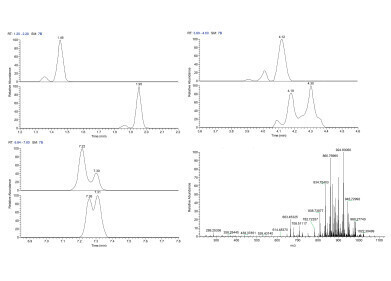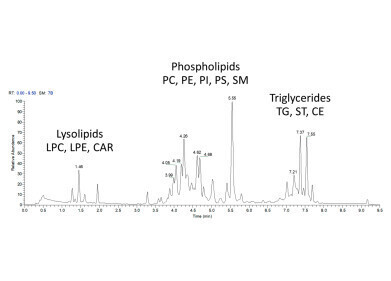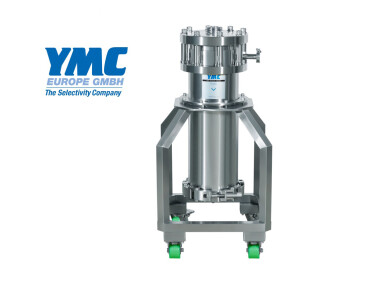-
 Figure 3: Chromatographic resolution of a) early eluting LPC/LPE (1.20–2.20 min), b) mid-gradient eluting PC/PE (3.60–4.60 min) and c) late eluting triglycerides (6.84–7.80 min) with d) a typical full scan spectrum at 7.27 min.
Figure 3: Chromatographic resolution of a) early eluting LPC/LPE (1.20–2.20 min), b) mid-gradient eluting PC/PE (3.60–4.60 min) and c) late eluting triglycerides (6.84–7.80 min) with d) a typical full scan spectrum at 7.27 min. -
 Figure 1: Fast lipidomic analysis with high resolution of the molecular species
Figure 1: Fast lipidomic analysis with high resolution of the molecular species
Columns (LC)
Fast lipidomic analysis with high resolution of the molecular species
Aug 27 2024
The lipid signature of biological samples, or lipidome, is remarkably different between health and disease states. Therefore, lipids are good candidates to produce potent biomarkers. From an analytical point of view analysis of lipidomes deals with a large number of isomeric compounds, making comprehensive separation essential to generate a biologically informative dataset.
In order to achieve sufficient separation, the analysis times with standard methods, commonly using C18 stationary phases, tend to be longer and typically feature runtimes of >20 min. However, measurements of large cohorts of clinical samples (>200 per batch) require shorter runtimes in order to maintain overall reliability and improve cost-efficiency of the analysis. This example uses human plasma samples to demonstrate that separations under 10 minutes, are also possible with real samples using a less hydrophobic YMC Accura Triart C8 column with bioinert coating to facilitate higher levels of sensitivity and recovery.
Figure 2 shows a well-defined separation between classes of lysolipids, phospholipids and triglycerides, typical for reversed-phase lipidomic analysis. Even with the less hydrophobic YMC-Triart C8 modification, molecular species of complex lipids can be feasibly separated in a fast run, as already visible from a TIC chromatogram. Hence, around 700 distinct molecules may be reliably determined during this fast analysis depending on the MS/MS performance of the spectrometer. The YMC-Triart C8 stationary phase has a very high specific surface area of 360m²/g, providing a sufficient loading capacity to accommodate the samples with a very high content of the analytes, such as plasma lipid extracts.
Figure 3 shows, as an example, the chromatographic resolution of some early, mid-gradient and late eluting lipids. The early eluting LPC and LPE and the mid-gradient eluting PC and PE can be separated with appropriate resolution. This LC-MS method is also suitable for the characterisation of late eluting triglycerides with similar retention.
The YMC Accura Triart C8 column used is equipped with a bioinert coating on the column body and frits. This ensures high recovery from the first injection since the lipids containing phosphate groups do not come into contact with metal surfaces, preventing adsorption. Twenty consecutive injections prove that the column provides reliable results from the first injection.
* Application data by courtesy of Sergey Girel, Institute of Pharmaceutical Sciences of Western Switzerland (University of Geneva), Geneva, Switzerland.
Events
May 11 2025 Vienna, Austria
May 18 2025 Tempe. AZ, USA
May 21 2025 Birmingham, UK
Jun 01 2025 Baltimore, MD, USA
Jun 15 2025 Bruges, Belgium

















